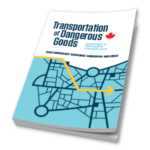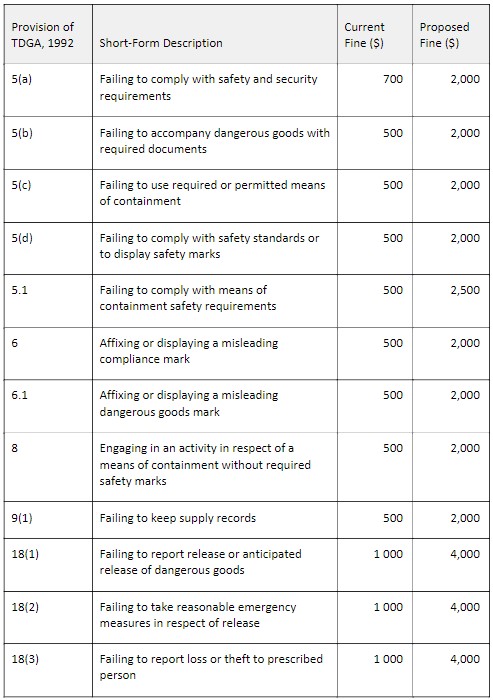
It Pays to Comply – Transport Canada Proposes Increasing Fines under “Contraventions Regulations”
Prices are going up everywhere these days, and soon that will also apply to the cost of violating Canada’s Transportation of Dangerous Goods Act (TDGA) and Regulations (TDGR). After all, the fines levied by the Act and the Regulations haven’t been updated much since the legislation first came into effect back in the 1980s, the time of leg warmers and big hair. So it’s not surprising that there’s now a move to increase penalties to ones more appropriate to the age of social media and cell phones.
Previously, we’ve mentioned that Transport Canada was planning on using Bill C-33 to update the Transportation of Dangerous Goods Act and increase the maximum fines (up to $10,000,000 from $100,000), as well as the maximum prison time. However, most violations are not assigned these “worst case scenario” penalties. Instead, minor violations are assigned typical fines under a different regulation, the “Contraventions Regulations,” which assesses what are called ticketing penalties for a number of regulations, including the TDGR.
What Does This Involve?
The Contraventions Act and Regulations was designed to deal with more minor offenses. It allows “violations of minor federal laws to be prosecuted through a ticketing system rather than a formal criminal charge.” Think of how a minor speeding ticket isn’t treated as a criminal charge, even though you can get fined for it. And much like traffic tickets, it’s primarily enforced by the provinces or territories, and their inspectors. Provincial ticketing procedures apply in those provinces that have signed an agreement with the federal government.
Justice Canada sums the effects of this system up as follows:
The federal ticketing procedure, pursuant to the Contraventions Act, is referred to as “the Contraventions Regime.” This procedure reflects the distinction between criminal offences and regulatory offences and offers an alternative to the summary conviction procedure set out in the Criminal Code. It allows enforcement authorities to commence the prosecution of a contravention by means of a ticket with the option of voluntary payment of the prescribed fine, thereby avoiding the longer and more costly procedure set out in the Criminal Code. This spares the offender from the legal ramifications of a Criminal Code conviction while ensuring that court and criminal justice resources can be focussed on the prosecution of more serious offences. This ticketing procedure can be a more reasonable and effective approach for minor offences, and provides for fines that are more proportionate to the seriousness of these offences. Where an enforcement officer believes a more serious response is required, the summary conviction procedure established in the Criminal Code remains open to them.
The overhaul of the “Contraventions Regulations” was started with an evaluation by Justice Canada between 2016-17 and 2019-20. This evaluation “recommended that relevant federal departments and agencies be engaged in a systemic review of fine levels, to ensure that the Contraventions Act is achieving its intended impact on those who commit offences designated as contraventions.” In other words, Justice Canada was tasked with making sure the penalties would serve as a real deterrent from careless or even deliberate failures to follow the law, and not just be seen as a “cost of doing business.”
The proposed revisions to the fines could see them increase by as much as four times per charge (remember, some incidents may result in a number of separate charges):
Note that exact fines may vary depending on the circumstances of the case and the judgment of the inspector.
The “Contraventions Regulations” do not only apply to transportation of dangerous goods. Other “schedules” (lists of ticketing fines) range from violations of the Migratory Bird Act to the National Defense Act.
What Should You Do About This?
Transport Canada may still consider comments and feedback at:
Department of Transport
Transportation of Dangerous Goods Directorate
L’Esplanade Laurier
330 Laurier Avenue West
Ottawa, Ontario
K1A 1J2
E-mail: [email protected]
Questions?
Do you have questions about this proposed amendment? Are you concerned about avoiding violations in the first place? Our team of experts is just a call away for our customers at 855.734.5469 or send us an email, we’re happy to help. We can advise you how to comply with current and upcoming regulations.
Stay up to date and sign up for our newsletter!
We have all the products, services, and training you need to ensure your staff is properly trained and informed.
 Glass Shipping Kits Glass Shipping Kits |
 Canadian TDG Publications Canadian TDG Publications |
 Worded Placards Worded Placards |
Sources:
Justice Canada, Transportation of Dangerous Goods Act, 1992
Justice Canada, Transportation of Dangerous Goods Regulations
Justice Canada, Contraventions Act
Justice Canada, Contraventions Regulations
Justice Canada, Evaluation of the Contraventions Act Program Final Report
Transport Canada, Public Consultation on proposed amendments to Schedule XV of the Contraventions Regulations (Transportation of Dangerous Goods Act, 1992)
Wikipedia, Contraventions Act








 ICC USA
ICC USA ICC Canada
ICC Canada